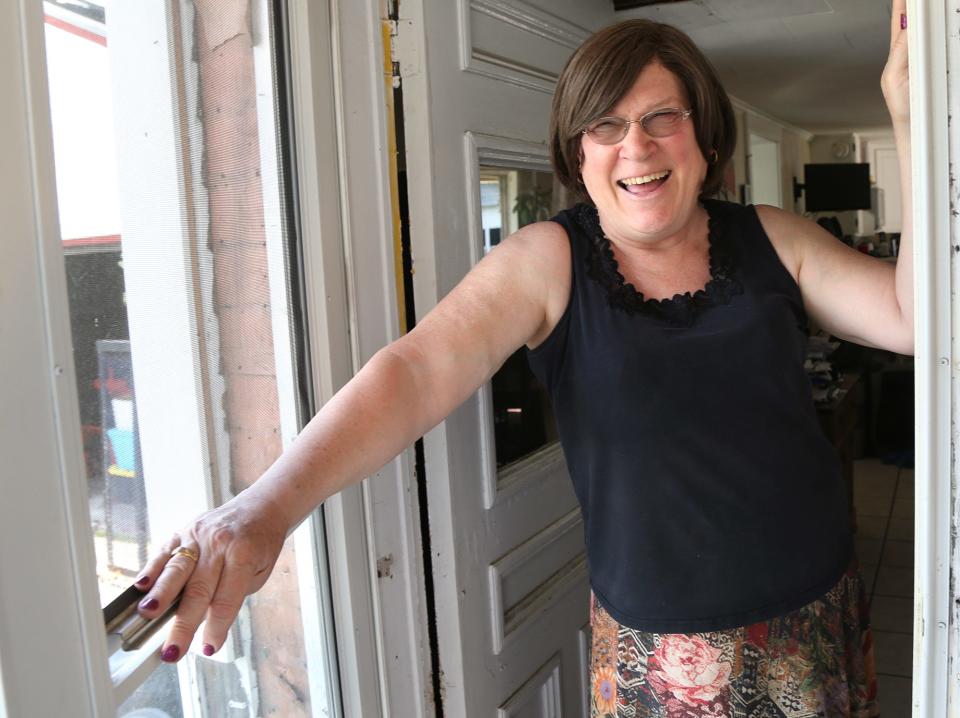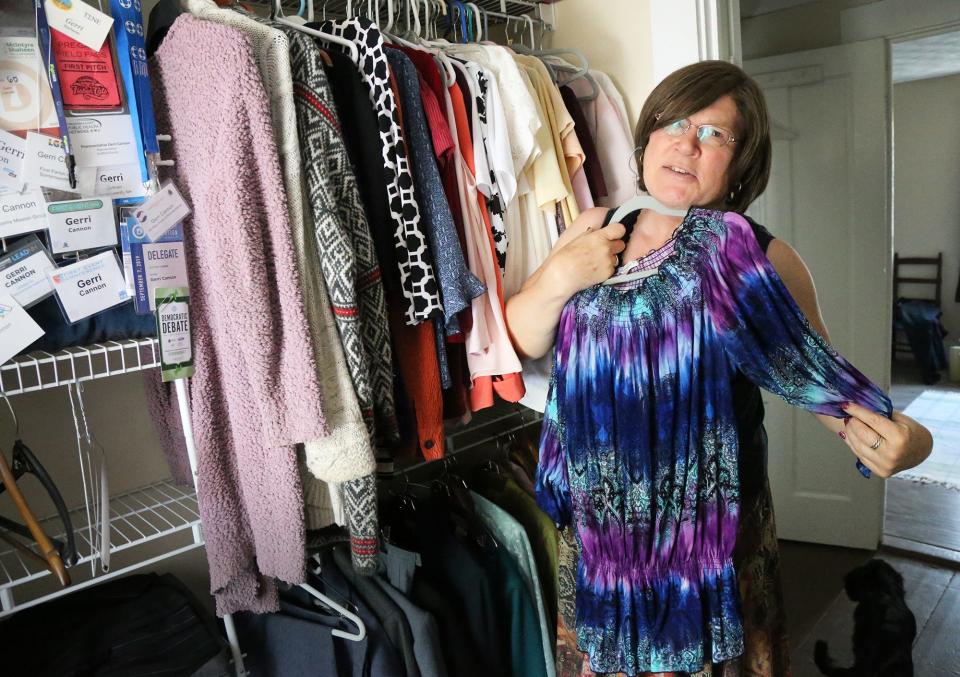History-making NH Rep. Gerri Cannon on why sex confirmation surgery was right for her
- Oops!Something went wrong.Please try again later.

SOMERSWORTH — Gerri Cannon is a member of her local school board, a state representative and transgender, in no particular order as they are all integral parts of the life she loves.
June is Pride month. At the age of "69 years young," Cannon is comfortable sharing her life story and insights with the public.
"I tell young people who are afraid to tell their parents, that this is their life and they have to have that discussion to know where they stand," Cannon said. "Some people will be surprised at how supportive their parents might be. I don't think my parents really understood my choices. My mom asked me once, after I was completely out, how I decided to live this lifestyle. I told her: I didn't decide to; that I lived that other lifestyle, and it wasn't working."

Portsmouth Pride 2022: Event will be bigger than before. Here's what you need to know
Cannon said things are easier for some people making their choices today and that makes her happy. She freely tells the story of how things were for her, growing up, making choices, and finally deciding, as an adult, she needed to be herself to be happy.
"It is easier, but the challenges I faced are still here for many," she said. "I think young people are believing in themselves more. There are still family issues and schools struggle with some situations. But people also tell me I am a role model, for their child and for them as well. I like that."
Gender confirmation surgery after long wait
After years of taking hormones, Cannon recently finished gender confirmation surgery. The surgery is a procedure to surgically alter a person so their genitalia corresponds to their self-identified sex.
“I gave this a lot of thought over the past couple of years, deciding finally to have the surgery,” Cannon said. “I had been on hormones for over 16 years. A big part of the decision was that I wanted to reduce the number of medications I was on.”

The other big part, for Cannon, was to complete her journey.
Cannon said the cost for gender confirmation surgery is upwards of $20,000.
“Some health insurance will cover it, and some will not,” she said. “Believe it or not, my Medicare would cover it. And my Medigap plan, through AARP, covered the rest.”
Cannon decided to go for it and began meeting with an endocrinologist a year ago. She had multiple conferences with therapists, cardiologists and psychologists, to make sure she was ready and healthy enough for the surgery.
“We set up the date for the orchiectomy, the surgery to remove my genitals,” Cannon said. “Then, on May 12, I had what is called a minimum depth vaginoplasty, which was done at Mass General Hospital. They have a transgender unit.”
A minimal depth vaginoplasty means she now has the appearance of female genitalia but does not have a vaginal canal.
“At my age, I did not see the need to go further,” she said. “I am not in a relationship and do not anticipate that at this point.”
Cannon was released to home the day after the surgery.
“I had such good care, and everyone was so nice to me,” she said. “My recovery was good. In a few days I could move around fairly well, if slowly. The pain was slight and now it’s almost gone. I made the right decision.”
Seacoast news: Download the Seacoastonline mobile app and the Fosters.com mobile app to stay connected.
Cannon has advice for anyone considering the surgery.
"I made this decision for me," she said. "It was the right decision for me, but I would advise anyone considering this today, to live for two years as their choice of gender, to make sure it is the right decision for you."
Childhood was challenging
Growing up in the 1960s was not an ideal nor an accepting time. Many topics, like being transgender, simply were not discussed openly.
"I grew up in Sudbury, (Massachusetts), a Colonial town," said Cannon. "I lived on a dead end, secluded street, with two brothers and one sister. I was the oldest. My parents are both deceased. My sister is still around. One brother passed away, and I have a brother who I haven't spoken to for 15 years, because he and his wife do not approve of my lifestyle."

It was in the 1960s, when Dennis Gerard Cannon was about 12 or 13, that Gerri realized she "was different."
"I told no one, and I had nothing to go on for information," she said. "I wanted to play dress-up, but my kid sister was 7 and her clothes didn't work. I was also embarrassed, being raised in a French Catholic household. My mom taught Sunday school. I knew I was different and I knew I had to hide it. I thought I was weird, so I buried it, drove myself into hiding."
'Dream a reality': Dover waterfront development approved with housing, eateries, park, more
Cannon said as she got older in school, she was not clear on her gender, but there was nowhere she could look for information or support. She said she was small, and a target for bullies.
"I was 103 pounds," she said. "I didn't want to use the communal showers at gym."
In her sophomore year, Cannon said a coach encouraged her to try out of for the wrestling team. It turned out she was good at it, and she eventually became a varsity wrestler, and the bullying stopped as she learned to protect herself.
"Sudbury was a very white community," she said. "We eventually got one Black family, and the son became my friend. My family was typical of the times. My father was a man's man, a heavy equipment operator who worked long hours and my mother stayed at home. There was a lot of love in my family and we were well taken care of. That contributed to driving me underground. I didn't want to hurt them. I wish I could have started on hormone blockers back then; I didn't even know they existed."
In her mid-teens, Cannon learned of Renee Richards, a transgender tennis player.
"That was my first inkling of who I am," she said. "I still hid, thought maybe it would go away."
Cannon went to Lowell Tech and discovered she had a knack for computer work. That led to a 31-year career at a large computer company, hired right out of college. She did field service work and training all over the world.
And her world began to open up.
She was already married and had two daughters.
"I would pack away a skirt or two," she said. "I'd bring a wig. I'd wear them in my hotel room but at first I was afraid to go out. I wanted to go out but it was like my hotel door had a glass panel that stopped me. I finally confided in a friend, and we went out in Texas and had a blast. When we returned to the hotel I was on an elevator full of people. I just looked forward, to the top floor. That was the start. If you go out and don't feel confident, you stand out as a man in a dress. It took time."
Little by little, Cannon started telling people.
"They were surprised, but most people realized I was still the same person," she said. "The hardest was telling my wife and daughters."
Cannon's daughters were mostly understanding. Cannon's wife was not.
"She didn't speak to me for a couple of months, and I slept in the spare room," Cannon said. "One of my daughters was writing a paper on derogatory terms used to describe gay people. I corrected her a few times and she asked me how I knew this. I told her. My daughters struggled but are now two of my strongest supporters. I have a 6-month-old granddaughter and an 8-year-old grandson. I love them all so much."
In Rochester: How Gafney Home is being revived as senior housing. Look inside 1894 mansion.
Eventually Cannon was asked to move out by her wife.
"It was kind of a relief," Cannon said. "I was going out every night, or sitting around miserable, watching television. I drank too much, but I needed her to tell me to go."
In 1998, Cannon started Triess, a support group for cross dressers and their spouses.
"We helped a lot of people," she said. "The group still exists, now as Renaissance New England."
Cannon bought a house in Merrimack and decided it was time to live life on her terms and tell her employer she was transgender.
"I told HR at (the computer company) and I was laid off," she said. "I could not prove that was the reason and there were no laws to protect transgender people. I started a carpentry business, Cannons Carpentry on Call."
Politics came next, transgender rights
"In 2008 or 2009, I was asked to help with a transgender rights bill because I had been involved with a group called Speak Out Boston," said Cannon. "I had a lot of experience with public speaking. I became a sort of independent lobbyist. The bill was pushed aside in favor of the same sex marriage bill which eventually passed."
Cannon said her business was failing because of the economy. She was facing foreclosure on her home, and in 2016 she changed her name legally to Gerri Cannon and became a long-haul trucker.
"I got to see the country from the seat of a truck," she said. "I faced discrimination from other truckers who told me I should be home taking care of babies. I told them I couldn't have babies. I worked 70-hour weeks, driving and trying to stay awake at 2 a.m."
At age 62, Cannon got a pension from the computer company where she was employed, and her family sold a property in Sunapee.
"I bought my house in Somersworth in 2014," she said. "I was still on the road and visited my house 12 times in the first year. I didn't finish unpacking until I stopped driving."
Cannon worked on legislation, trying to assure New Hampshire cities would support transgender people in the workforce.
Rochester: Lilac City Funfest returning in 2022.
"I worked in Somersworth with Mayor Dana Hilliard," she said. "I told him I was considering running for state rep. He suggested I run for school board first, to learn more about the community I lived in. I ran in 2016, and beat out his husband for school board. In 2019, I became a state representative and have been running for both positions ever since. I was out, and not worried about my past history. I was making history."
Cannon and Lisa Bunker of Exeter, both Democrats, were the first two openly transgender people elected to the New Hampshire House in November 2018, taking office in January 2019.
Today, Cannon said she is happy and fulfilled.
"I am treated with respect, by people who really know me for who I am," she said. "People like to be with me. When I walk down the street, friends wave and say hi. I feel more at home in Somersworth than I have ever felt anywhere in my entire life."
This article originally appeared on Fosters Daily Democrat: NH Rep. Gerri Cannon on why sex confirmation surgery was right choice

